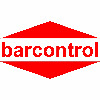ESD ELECTRONICS GMBH
Germany
Manufacturer/ Producer
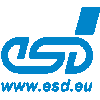
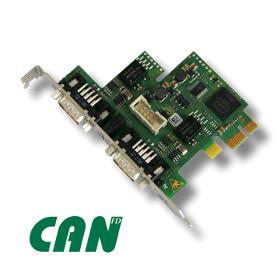
ESD ELECTRONICS GMBH
Germany
The CAN-PCIe/402-FD is a PC board designed for the PCIe bus that features one or two electrically isolated CAN FD interfaces according to ISO 11898-2 via DSUB9 connectors. Equipped with up to two CAN FD interfaces the board is available as low profile versions. In the CAN-PCIe/402-B4-FD version 4 CAN FD interfaces can be connected via one 37-pin DSUB connector. The CAN FD interfaces are designed according to ISO 11898-1:2015. They are driven by the ISO 16845:2004 certified esdACC (esd advanced CAN Core), implemented in the Intel FPGA. All CAN FD versions are fully backwards compatible with CAN and can also be used in Classical CAN applications. The FPGA supports bus mastering (first-party DMA) to transfer data to the host memory. This results in a reduction of overall latency on servicing I/O transactions in particular at higher data rates and a reduced host CPU load.
Request for a quote
ESD ELECTRONICS GMBH
Germany
The CAN-PCIeMini/402-2 is an add-in PCI Express Full-Mini Card, that features two electrically isolated CAN High-Speed interfaces. The PCI Express® Mini Card comes with two CAN FD interfaces. There is also a version that can be used for extended temperature range. The optional adapter CAN-PCIeMini/402-DSUB9 comes with a DSUB9 connector, selectable on board CAN termination and an adapter cable. All CAN FD versions are fully backwards compatible with CAN and can also be used in Classical CAN applications. The independent CAN nets are driven by the ISO 16845:2004 certified esdACC (esd Advanced CAN Core) implemented in the Altera FPGA. The FPGA supports bus mastering (firstparty DMA) to transfer data to the host memory. This results in a reduction of overall latency on servicing I/O transactions in particular at higher data rates and a reduced host CPU load. Due to the usage of MSI (Message Signaled Interrupts) the board can be operated for for example in Hypervisor environments.
Request for a quote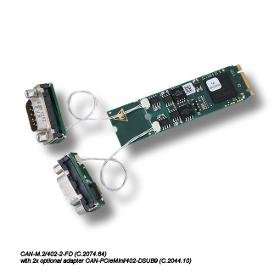
ESD ELECTRONICS GMBH
Germany
The CAN-M.2/402-2-FD is an M.2 Card, that features two electrically isolated CAN FD interfaces. The optional adapter CAN-PCIeMini/402-DSUB comes with a DSUB9 connector, selectable on-board CAN termination and an adapter cable. CAN-M.2/402-2-FD is fully backwards compatible with CAN and can also be used in Classical CAN applications. The independent CAN nets are driven by the ISO 16845:2004 certified esdACC (esd Advanced CAN Core) implemented in the Intel FPGA. The FPGA supports bus mastering (first-party DMA) to transfer data to the host memory. This results in a reduction of overall latency on servicing I/O transactions, in particular at higher data rates and a reduced host CPU load. Due to the usage of MSI (Message Signaled Interrupts) the CAN-M.2/402-2-FD can be operated for example in Hypervisor environments. The CAN-M.2/402-2-FD provides high resolution 64-bit hardware timestamps for CAN messages. A wide range of software support and customization is available on request.
Request for a quote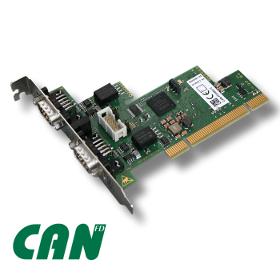
ESD ELECTRONICS GMBH
Germany
The CAN-PCI/402-2-FD is a PC board designed for the PCI bus that features two electrically isolated high-speed CAN FD interfaces according to ISO 11898-1:2015. The CAN FD interfaces are driven by the ISO 16845:2004 certified esdACC implemented in the Intel® FPGA. With a higher bit rate in the data phase in combination with the increase of efficiency by a higher number of user-data bytes, CAN FD offers a higher data throughput while maintaining the benefits of Classical CAN. The board is fully backwards compatible with CAN and can be also used in Classical CAN applications. The FPGA supports bus mastering (firstparty DMA) to transfer data to the host memory. This results in a reduction of overall latency on servicing I/O transactions in particular at higher data rates and a reduced host CPU load. Due to the usage of MSI (Message Signaled Interrupts) the CAN-PCI/402-2-FD can be operated for example in Hypervisor environments. The board provides high resolution hardware timestamps.
Request for a quote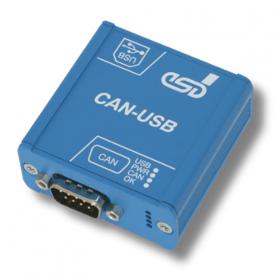
ESD ELECTRONICS GMBH
Germany
The CAN-USB/2 module is an intelligent CAN interface with an ARM 7 microcontroller for the local management of CAN data. The module supports the USB 2.0 High Speed interface with data rates of 480 Mbit/s. The ISO 11898-compliant CAN interface allows a data transfer rate of a maximum of 1 Mbit/s. The CAN interface is electrically isolated from other potentials by means of a digital isolator and a DC/DC converter. Software drivers for Windows® 2K/XP/Vista/7/8 (32/64 bit) are included in delivery. Linux® kernel ≥ 2.6 is supported via Linux CAN (SocketCAN) and NTCAN wrapper library. Drivers for other operating systems are available on request. The firmware can be updated from the PC. Updates are available on the esd website. Libraries for the higher layer protocols CANopen and J1939 are available. Additional free-of-charge esd CAN tools for Windows offer efficient setup and analysis of CAN applications and networks.
Request for a quote
ESD ELECTRONICS GMBH
Germany
The CANopen-PN can link any PROFINET IO controller to a CANopen network. The gateway operates as a PROFINET IO device with a maximum of 1440 bytes input data and 1440 bytes output data on the PROFINET IO bus. The CANopen-PN connects CANopen modules with CANopen (CiA 301) applications to e.g. a SIMATIC-S7. A maximum number of 127 CANopen nodes can be connected to the gateway. The CAN high speed (ISO 11898-2) compatible interface allows a maximum data-transfer rate of 1 Mbit/s. The 100 BASE-TX PROFINET IO interface is compatible to IEEE802.3 and runs at 100 Mbit/s. The gateway is designed according to PROFIBUS International Document TC2-09-0002 (CANopen-Integration_7012 d07_Jul09). The PROFINET IO interface and the CAN interface are electrically isolated. The module can be configured via PROFINET IO configuration tool GSDML- Composer. The esd CAN tools (CANreal, CANplot, CANrepro, CANscript, COBview) can be used additionally for CAN diagnostics.
Request for a quote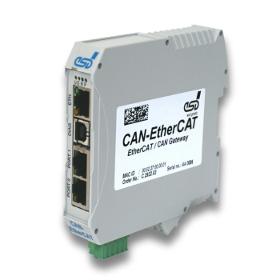
ESD ELECTRONICS GMBH
Germany
The CAN-EtherCAT gateway can link CAN modules with CANopen (CiA DS 301) or layer-2 (ISO 11898-1) implementation to a realtime EtherCAT network. The EtherCAT slave functionality is in accordance with ETG Modular Device Profile No. 5000. The module can also be configured as Ethernet switch port using the EoE protocol. Firmware updates are possible via web interface (EoE) or FoE (File access-over-EtherCAT). The CAN high speed (ISO 11898-2) compatible interface allows a maximum data-transfer rate of 1 Mbit/s. The 100BASE-TX EtherCAT interface is compatible to IEEE 802.3 and runs with 100 Mbit/s. The EtherCAT as well as the CAN interface are electrically isolated. Customization on Request.
Request for a quote
ESD ELECTRONICS GMBH
Germany
The CPCIserial-CAN/402-4-FD comes with two or four independent CAN FD interfaces via DSUB25 according to ISO 11898-1:2015. The CAN FD interfaces are driven by the ISO 16845:2004 certified esdACC (esd advanced CAN Core) implemented in the Altera FPGA. With a higher bit rate in the data phase in combination with the increase of efficiency by a higher number of user-data bytes, CAN FD offers a higher data throughput while maintaining the benefits of Classical CAN. The board is fully backwards compatible with CAN and can also be used in Classical CAN applications. The FPGA supports bus mastering (firstparty DMA) to transfer data to the host memory. This results in a reduction of overall latency on servicing I/O transactions in particular at higher data rates and a reduced host CPU load. Due to the usage of MSI (Message Signaled Interrupts) the CPCIserial-CAN/402-4-FD can be operated for example in Hypervisor environments.
Request for a quote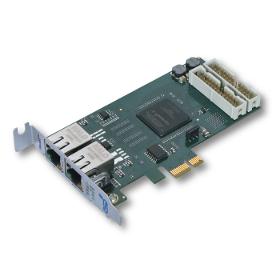
ESD ELECTRONICS GMBH
Germany
The ECS-PCIe/FPGA is an EtherCAT Slave Controller board designed for the PCI Express bus. It utilizes a Beckhoff IP-Core which is implemented in an Altera® FPGA and configured for 8 FMMUs, 8 Sync Managers, 60 kB DPRAM and 64 bit Distributed Clocks. The FPGA connects between the PCI Express bus and the two Ethernet interfaces on the front panel. Because of this simple hardware topology and the use of a “soft” controller the design offers a maximum of flexibility. The PCI Express system can act as an I/O node. An EtherCAT master can use several EtherCAT protocols like CoE, FoE and EoE to communicate with this EtherCAT slave device. Via pin header connectors equipped on the ECS-PCIe/FPGA 36 3.3 V LVTTL I/Os are available, including the signals from the EtherCAT Slave Controller: 2x Sync and 2x Latch for system synchronization. Device drivers for Windows® and Linux® with documentation and EtherCAT slave examples are included in the scope of delivery. Other (real time) OS on request.
Request for a quote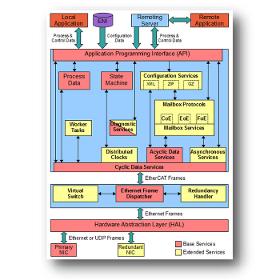
ESD ELECTRONICS GMBH
Germany
Features - Configuration and management of EtherCAT networks - Cyclic exchange of process data - Sophisticated API common to all implementations as interface between the application and the EtherCAT Master Stack - Mailbox based communication with: CAN application protocol over EtherCAT (CoE) Ethernet over EtherCAT (EoE) File over EtherCAT (FoE) Servo Drive over EtherCAT (SoE) - Built-in detailed diagnostics and profiling functions - Written in ANSI-C designed with high performance, small resource usage and scalability in mind - The core components are operating system (OS) and CPU architecture independent - Adaption to many prevalent (real-time) operating systems available from stock - EtherCAT Master Class A according to ETG.1500 esd electronics is a member of the EtherCAT Technology Group (ETG).
Request for a quoteManufacturer/ Producer
Vahrenwalder St. 207
30165 Hanover - Germany
europages also recommends
A selection of companies related to the activity:
A selection of products that might interest you
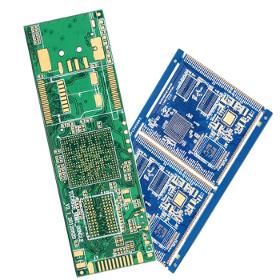
XIAMEN NINESUN IMP. & EXP. CO., LTD
China
Place of Origin: China Base Material: FR-4 Copper Thickness: 1/2OZ 1OZ 2OZ 3OZ Board Thickness: 0.8mm Min. Hole Size: 0.1mm Min. Line Width: 0.065mm Min. Line Spacing: 0.065mm Surface Finishing: HASL Application: Electronics Device Type: Customizable Solder mask: Black Material: FR4 CEM1 CEM3 height TG Color: Red Blue Green Black Testing Service: 100% Supply Ability: 25000 Square Meter/Square Meters per Month
Request for a quote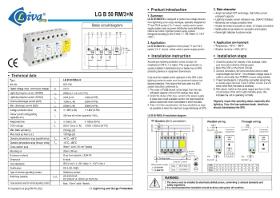
LIVA GROUP ELECTRIC ELECTRONIC CONSTRUCTION
Turkey
Adopt Hermetical GDT technology Lightning Impulse Current withstand max 250KA Extremely low voltage protection level Double terminals for parallel or series connection. Green lights indicates functional mode.
Request for a quote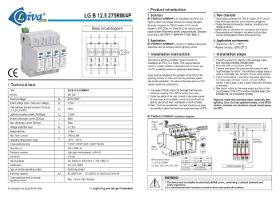
LIVA GROUP ELECTRIC ELECTRONIC CONSTRUCTION
Turkey
Three-phase protection for TNC-S System High discharge capacity ,quick response,pluggable Multifunctional conneciton for conductors and busbars Green window will change to red when fault and also provide remote alarm control at the same time
Request for a quote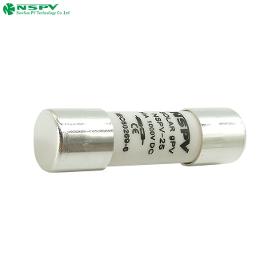
NEWSUN PV TECHNOLOGY CO.,LTD
China
NSPV Solar(PV) Power Protection Fuse 1000VDC NSPV-25 type This series of specifications for the use of the physical, rated working voltage 1000V, rated current 1-30A electric line for overload or short circuit protection which comply with IEC60269-6 standard.
Request for a quoteRequest for quotes
Create one request and get multiple quotes form verified suppliers.
- Only relevant suppliers
- Data privacy compliant
- 100% free
